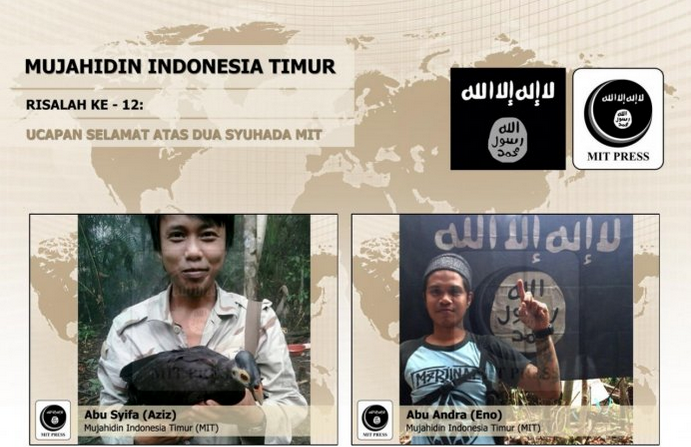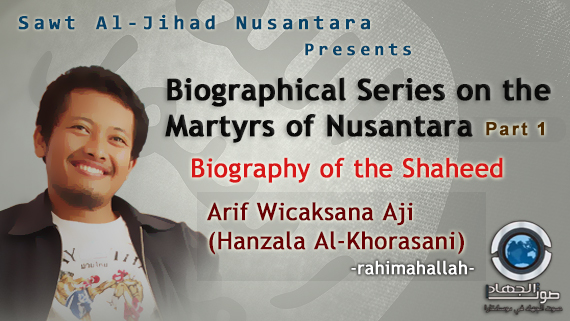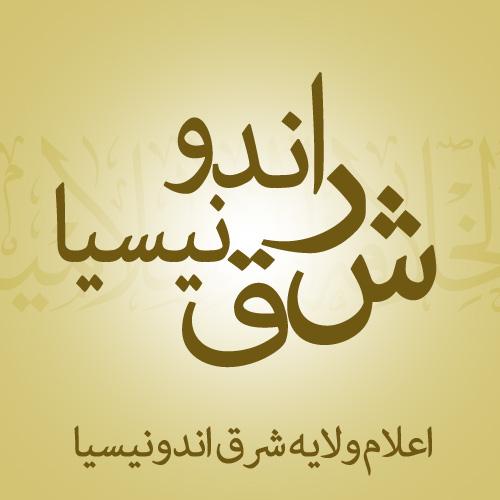
Click the following link for a safe PDF copy: Shaykh Abū Wardah — “A Series of Poems Written on the Wall #3”
____________________
To inquire about a translation for this statement for a fee email: [email protected]
Category: Indonesia
New statement from Sawt al-Jihād in Nusantara: "Attack Them With the Same Attack"

Click the following link for a safe PDF copy: Sawt al-Jihād in Nusantara — “Attack Them With the Same Attack”
_____________________
MIT Press presents a new statement from Mujāhidīn of Indonesia Timur: "Congratulations to the Two Martyrs of the Mujāhidīn in Eastern Indonesia"

Click the following link for a safe PDF copy: Mujāhidīn of Indonesia Timur — “Congratulations to the Two Martyrs of the Mujāhidīn in Eastern Indonesia”
_______________
To inquire about a translation for this statement for a fee email: [email protected]
New release from Forum Islam al-Busyro: "Death of the Commander Sabar Subagyo (Daeng Koro)"

Click the following link for a safe PDF copy: Forum Islam al-Busyro — “Death of the Commander Sabar Subagyo (Daeng Koro)”
______________
To inquire about a translation for this release for a fee email: [email protected]
MIT Press presents a new statement from Mujāhidīn of Indonesia Timur: "Nature of the PPRC Operation, the Tyrant of Indonesia"

Click the following link for a safe PDF copy: Mujāhidīn of Indonesia Timur — “Nature of the PPRC Operation, the Tyrant of Indonesia”
________________
To inquire about a translation for this statement for a fee email: [email protected]
New statement from Sawt al-Jihād in Nusantara: "Biographical Series on the Martyrs of Nusantara, Part 1: Biography of Arif Wicaksana Aji (Hanzala al-Khurāsānī), General Manager of the Indonesian al-Busyro Islamic Forum"

Click the following link for a safe PDF copy: Sawt al-Jihād in Nusantara — “Biographical Series on the Martyrs of Nusantara, Part 1- Biography of Arif Wicaksana Aji (Hanzala al-Khurāsānī), General Manager of the Indonesian al-Busyro Islamic Forum”
_________________
MIT Press presents a new statement from Mujāhidīn of Indonesia Timur: "Message For the Muslim Ummah"

Click the following link for a safe PDF copy: Mujāhidīn of Indonesia Timur — “Message For the Muslim Ummah”
_____________
To inquire about a translation for this statement for a fee email: [email protected]
Check out my new article for The National Interest: "What Do Asian-Oceanic Nations Think about ISIS?"

Recently, I had the opportunity to travel to a number of key Asian-Oceanic nations and allies of the United States to discuss issues related to Iraq, Syria, the Islamic State (IS) and foreign fighters. While much of the focus in Washington has been on the role of Western European and Arab partners in the fight, Asian-Oceanic countries also have their own interests related to this issue. In particular, I spoke with governmental officials, academic scholars and others in Singapore, Japan, China, New Zealand and Australia. While each country looks at the problem-set through a different lens and/or interests, as well as has varying degrees of threat-levels, it is clear that all are concerned and want to take an active role in combatting it.
Click here to read the rest.
The Clairvoyant: Turks Or Uyghurs Arrested In Indonesia?
Earlier this week, reports surfaced that four Turks had been arrested in Poso, Indonesia related to links with the Islamic State. It was later revealed though that in fact they were Uyghurs from Xinjiang, China. Why the confusion? There is actually a relatively simple answer to this, which was recently provided by a jihadi online that also helps us better understand some of the processes for how individuals are making their way toward Syria.
According to an individual that uses the name Abdullah Abu Bakr, Uyghurs have a difficult time obtaining Chinese passports to travel abroad. I personally cannot attest or know the veracity of this claim since I do not follow Chinese policies on this issue closely. That said, if one takes it as stated, because of this, these wannabe Uyghur foreign fighters then create fake passports, specifically from Turkey. He then claims they venture to Malaysia or Thailand where they might spend some time in prison, but afterwards because they were caught with these fake Turkish passports they are then deported to Turkey. Once in Turkey, according to him, Turkish officials view the Uyghurs as Turkic peoples and therefore allow them to safely stay in Turkey, which then allows the Uyghurs to safely get into Syria. This again raises questions about Turkish potential in enabling of the foreign fighter flow into Syria. He then warns that if any of this process gets snuffed out then the individuals attempting to fight jihad in Syria (and/or Iraq) will get sent back to China and face prison there. In part, this is likely why Indonesia at first believed the individuals arrested were from Turkey.
Of course, he does not mention Indonesia, but I do not see why this process couldn’t have played out there as well, whereby individuals from Xinjiang using fake Turkish passports traversed to Indonesia. Once there, the hope being to be deported then to Turkey so they can make easy entrance into Syria. This illustrates not only the efforts that go into trying to get to Syria, but also highlights that there is a network of individuals that has created a system to try and get individuals over there even if the process might take some time, arduous, and risky. It also likely shows that there are more interlinked connections between the different jihadi facilitation networks in south/southeast Asia as well as how they then connect back to the facilitation networks based in Turkey and/or the Arab world.
What the Syrian conflict has done is regenerate old networks, connect separate past networks that now overlap, and the creation of new ones that are now part of the broader echo system related to global jihadism. These connections created for going to join up to fight in Syria/Iraq will also be important for any potential returnees and/or the use of external operations if it is in the cards either for the Islamic State or al-Qaeda’s branch Jabhat al-Nusra. All of this just highlights that there is a very sophisticated methodology for ways in which individuals not so close to Syria get there that helps not only those that want to get there, but cements key relations that could be relevant to future jihad in south/southeast Asian countries.
MIT Press presents a new interview with Mujāhidīn of Indonesia Timur’s Shaykh Abū Wardah
 =&0=&=&1=&=&2=&=&3=&=&4=&
لا تنسوا إخوانكم المجاهدين من دعائكم
=&0=&=&1=&=&2=&=&3=&=&4=&
لا تنسوا إخوانكم المجاهدين من دعائكم=&6=& Syawal 17, 1435 H=&8=&ديوان الإعلام من المجاهدين في شرقإندونيسيا||=&10=&
____________
